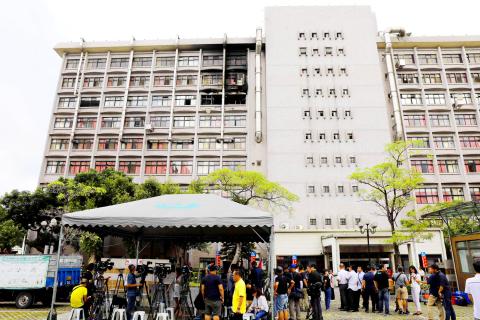Nine people were killed and 30 injured in an early-morning fire yesterday at the Taipei Hospital in New Taipei City’s Sinjhuang District (新莊).
New Taipei City Fire Department Director Huang Te-ching (黃德清) said he received a report of a fire at 4:36am, from room number 7A23 in the hospice section of the nine-story hospital.
Thick smoke was already pouring from the seventh floor of the building when firefighters arrived, he said.

Photo: Daniel Shih, AFP
Four patients and a foreign worker were in room 7A23 when the fire broke out, he said.
There were a total of 32 patients, two caregivers, one nurse and eight foreign workers on the floor at the time, he said, adding that the fire was put out at 5:27am.
The Ministry of Health and Welfare, which runs the hospital, said that as of 4pm, a total of 243 firefighters and paramedics had been deployed to the scene and about 300 patients and healthcare workers had been evacuated, including 39 people who were sent to other healthcare facilities for immediate treatment.

Photo: CNA
As of press time last night, nine people were confirmed dead, nine were in intensive care units and one was in an emergency room observation unit, the ministry said.
Nine patients from the seventh floor had been moved to other facilities, and one had been discharged, it said.
The fire department’s preliminary investigation suggests the fire was caused by a short circuit in an electric bed, but the alarm was not raised for nine minutes, Huang said.
Contributing factors to the casualty toll was that the mattresses were flammable and the door to room 7A23 was not closed during the evacuation, he said.
Deputy Minister of Health and Welfare Hsueh Jui-yuan (薛瑞元) said the ministry’s preliminary understanding was that a nurse and a caregiver were able to push three of the beds out of room 7A23, but the room was filled with smoke by the time they tried to push the fourth bed out and the bed became stuck in the door.
The patient in the bed had to be physically carried out and the door was left open, Hsueh said.
The ministry has established an emergency response task force to handle the case.
Its main goals are to ensure that the evacuated patients were treated properly, and to cooperate with the fire department to understand what caused the fire and to prevent a similar accident, he said.
He denied that there might have been a shortage of hospital personnel at the time of the fire.
It was unreasonable at this time to criticize hospital personnel for delaying reporting the fire, but if the investigations showed that to be the case, the ministry would boost training for hospital fire emergency responses, he said.
Premier William Lai (賴清德), Hsueh and the hospital’s deputy superintendent, Lin San-chi (林三齊), apologized to patients, their families and the public for the fire.
An order has been issued to upgrade fire prevention measures at hospitals nationwide, Lai said.
Additional reporting by CNA

NATIONAL SECURITY THREAT: An official said that Guan Guan’s comments had gone beyond the threshold of free speech, as she advocated for the destruction of the ROC China-born media influencer Guan Guan’s (關關) residency permit has been revoked for repeatedly posting pro-China content that threatens national security, the National Immigration Agency said yesterday. Guan Guan has said many controversial things in her videos posted to Douyin (抖音), including “the red flag will soon be painted all over Taiwan” and “Taiwan is an inseparable part of China,” while expressing hope for expedited “reunification.” The agency received multiple reports alleging that Guan Guan had advocated for armed reunification last year. After investigating, the agency last month issued a notice requiring her to appear and account for her actions. Guan Guan appeared as required,

A strong cold air mass is expected to arrive tonight, bringing a change in weather and a drop in temperature, the Central Weather Administration (CWA) said. The coldest time would be early on Thursday morning, with temperatures in some areas dipping as low as 8°C, it said. Daytime highs yesterday were 22°C to 24°C in northern and eastern Taiwan, and about 25°C to 28°C in the central and southern regions, it said. However, nighttime lows would dip to about 15°C to 16°C in central and northern Taiwan as well as the northeast, and 17°C to 19°C elsewhere, it said. Tropical Storm Nokaen, currently

PAPERS, PLEASE: The gang exploited the high value of the passports, selling them at inflated prices to Chinese buyers, who would treat them as ‘invisibility cloaks’ The Yilan District Court has handed four members of a syndicate prison terms ranging from one year and two months to two years and two months for their involvement in a scheme to purchase Taiwanese passports and resell them abroad at a massive markup. A Chinese human smuggling syndicate purchased Taiwanese passports through local criminal networks, exploiting the passports’ visa-free travel privileges to turn a profit of more than 20 times the original price, the court said. Such criminal organizations enable people to impersonate Taiwanese when entering and exiting Taiwan and other countries, undermining social order and the credibility of the nation’s

‘SALAMI-SLICING’: Beijing’s ‘gray zone’ tactics around the Pratas Islands have been slowly intensifying, with the PLA testing Taiwan’s responses and limits, an expert said The Ministry of National Defense yesterday condemned an intrusion by a Chinese drone into the airspace of the Pratas Islands (Dongsha Islands, 東沙群島) as a serious disruption of regional peace. The ministry said it detected the Chinese surveillance and reconnaissance drone entering the southwestern parts of Taiwan’s air defense identification zone early yesterday, and it approached the Pratas Islands at 5:41am. The ministry said it immediately notified the garrison stationed in the area to enhance aerial surveillance and alert levels, and the drone was detected in the islands’ territorial airspace at 5:44am, maintaining an altitude outside the effective range of air-defense weaponry. Following